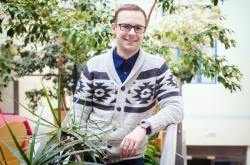The main purpose of the bloTope project (Building an IoT OPen innovation Ecosystem for connected smart objects) is to develop an infrastructure for horizontal interoperability between internet of things' services. The project works on open API and frameworks for providing smart devices united in systems. As a part of this project ITMO University will conduct a comprehensive research on approaches to waste recycling in a smart city.
According to Alexander Bikkulov, head of the Center for Project Development and Fundraising, the grant by the Horizon 2020 is a result of joint efforts made by many university’s departments. To become a grant winner the University had to become a winner of both Russian and European contests. It required filling lots of application forms and dealing with a huge amount of paperwork — this process usually takes lots of efforts, that is why few organizations manage to do this.
"Having received a support from the federal state program gives us an opportunity to take part in the bloTope on equal terms with European colleagues," noted Mr. Bikkulov.
The total amount of applications by Russian organizations was nine — three of them, including ITMO’s, were approved. Other candidates didn’t manage to meet the strict requirements of the contest. According to Andrey Rybin, head of the International Laboratory Modern Communication Technologies and their Applications for Economics and Finance — Fin Q, ITMO’s experts have created a wonderful model of interaction with international support programs for researchers. "We have already completed this work and have signed an agreement that gave us an opportunity to participate in the blo Tope consortium," noted Mr. Rybin.
ITMO’s experts plan to develop interaction of smart objects using blockchain technologies as a basis. They work on "smart" contracts, a united transaction register and a network’s decentralization — all these things will provide strong interaction of devices and stable system’s operation.
"Apart from cryptocurrency, blockchain technologies have other applications that help to set processes that move beyond "human-human" and "human-service" interaction models. Thanks to a smart contract mechanism, it is possible to develop effective and cheap business processes that don’t require an operator’s assistance," said Oleg Sadov, researcher at the Fin Q lab.
Not only experts and researchers from ITMO University, but also its students will take part into the project. This year the Department of Mathematical Physics and Information Theory in cooperation with St. Petersburg Department of V.A. Steklov Institute of Mathematics of the Russian Academy of Sciences launched a Master’s program "Mathematical Physics and Theory of Information." Its students will participate in cutting edge research activities including block chain project.
"The grant and partnership with European colleagues open new doors — we plan to vary our educational program as well as open an international training center for PhD students in the field of the Internet of Things," mentioned Andrey Rybin.
Horizon 2020 is an effective tool for supporting research cooperation on different levels, and ITMO University has now become one of the few Russian organizations that take part in the international bloTope consortium, financed by Horizon 2020 as full members.




